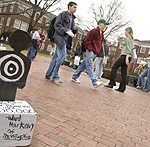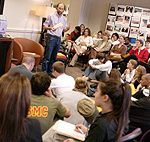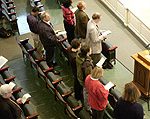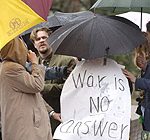Read this note for a summary of events on campus during the week of March 17-21 related to the war in Iraq...
 Elon Students for Peace and Justice were joined by other members of the community Monday, March 17 at Fonville Fountain to show their support for a peaceful solution to the crisis in Iraq. Students, faculty and staff stopped by to sign their name to a declaration promoting a peaceful end to the situation in Iraq. The students displayed cutouts in the shape of humans, each with a bullseye on them, to symbolize the people who will be affected by military action in Iraq.
Elon Students for Peace and Justice were joined by other members of the community Monday, March 17 at Fonville Fountain to show their support for a peaceful solution to the crisis in Iraq. Students, faculty and staff stopped by to sign their name to a declaration promoting a peaceful end to the situation in Iraq. The students displayed cutouts in the shape of humans, each with a bullseye on them, to symbolize the people who will be affected by military action in Iraq.
“We wanted to bring something here to campus to raise awareness that a peaceful solution is possible,” says Alice Dull, a senior from Winston-Salem, N.C., and a member of Students for Peace and Justice. “I hear people grumbling that they don’t want the war, so we wanted to hold this event to let them know that there are others who share their views.”
On Tuesday, March 18, more than 60 students, faculty and staff packed the Isabella Cannon Centre for International Studies for a discussion on the Iraq situation. Philosophy professor Anthony Weston moderated the discussion. The softspoken professor began by observing a moment of silence and then setting some guidelines for the discussion, which he called “Common Ground.”
 “No one side has a monopoly on what it is to be American, what it is to be loyal, what it is to support the troops,” Weston said. “No one’s commitment to America is questioned.” He encouraged the group to “start with commonality rather than opposition.”
“No one side has a monopoly on what it is to be American, what it is to be loyal, what it is to support the troops,” Weston said. “No one’s commitment to America is questioned.” He encouraged the group to “start with commonality rather than opposition.”
Jeff Pugh, professor of religious studies, began the discussion by reading some thoughts he had prepared on the Iraq issue. Pugh said that he believes that President Bush is sincere in his beliefs that a war with Iraq is the best course for the country. “The real question is, what type of country do we want to be, and what type of people do we want to become?” he said.
The group then discussed possible alternatives to war, such as indicting Hussein for human rights violations and increasing cultural understanding.
Tom Arcaro, professor of sociology, encouraged the group to use communication as a possible alternative. “If we keep expanding the circle of contacts we have, that’s in the interest of nonviolence.”
 Prayers and songs for all those affected by war were offered during Elon’s weekly College Chapel service Thursday morning, March 20 in Whitley Auditorium. Chaplain Richard McBride opened the service, noting, “We have come to the awful moment which comes all too often in our world, when nations are at war.” The chapel service began about 12 hours after the first military strikes were launched on Iraq Wednesday night.
Prayers and songs for all those affected by war were offered during Elon’s weekly College Chapel service Thursday morning, March 20 in Whitley Auditorium. Chaplain Richard McBride opened the service, noting, “We have come to the awful moment which comes all too often in our world, when nations are at war.” The chapel service began about 12 hours after the first military strikes were launched on Iraq Wednesday night.
Prayers, poems and songs were offered by Father John Ruffo of Campus Catholic ministry; Ray Crompton of Elon’s Intervarsity ministry; Rev. Dian Jackson, associate minister at Elon Community Church; and Rev. Steve Johnson of the United Church of Christ’s national staff.
At noon Thursday, about 20 students, faculty and staff gathered around Fonville Fountain, despite a steady rain, to voice their opposition to war with Iraq. Jamie Dupont, a junior from Palm Beach, Fla., said it was important for people on both sides of the issue to voice their opinions.
 “A lot of people aren’t informed about this war, so I think it’s important to be out here to open the eyes of people. Whether the gathering is small or large, it’s important to get your point across.”
“A lot of people aren’t informed about this war, so I think it’s important to be out here to open the eyes of people. Whether the gathering is small or large, it’s important to get your point across.”
Dupont said she believed most people have an opinion about the war, but haven’t expressed it because they don’t believe the war will affect their everyday lives.
“It’s kind of like voting. People don’t take the time out of their busy lives to vote, so they won’t take the time to come to something like this, either to support or oppose the war. They sit back and say, ‘It’s not going to affect me.'”


